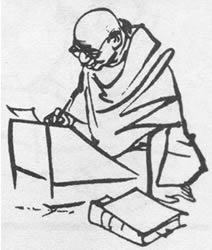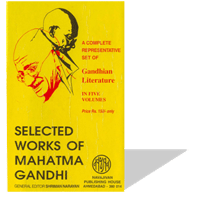
P.O. SEVAGRAM, DIST.WARDHA 442102, MS, INDIA. Phone: 91-7152-284753
FOUNDED BY MAHATMA GANDHI IN 1936
SECTION II : Extracts From Letters
[ from Selected Works of Mahatma Gandhi : Vol - 4 ]

SELECTED LETTERS
from
Selected Works of Mahatma Gandhi
Volume IV
Table of Contents
- Foreword
- Publisher's Note
SECTION I : LETTERS
- 1. To Dadabhai Naoroji
- 2. To G. K. Gokhale
- 3. To G. K. Gokhale
- 4. To Tolstoy
- 4A. From Count Leo Tolstoy
- 5. To Count Leo Tolstoy
- 6. To Leo Tolstoy
- 6A. From Count Leo Tolstoy
- 7. To Leo Tolstoy
- 7A. From Count Leo Tolstoy
- 8. To Maganlal Gandhi
- 9. To Maganlal Gandhi
- 10. To Narhar Shabhurao Bhave
- 11. To Mr Maffey, Private secretary To Viceroy
- 12. To W. B. Heycock
- 13. To Shankarlal on Ideas About Satyagraha
- 14. To Vinoba Bhave
- 15. To C F Andrews
- 16. To C F Andrews
- 17. To C F Andrews
- 18. To Kasturba Gandhi
- 19. To Kishorelal Mashruwala
- 20. To Sarojini Naidu
- 21. To Srinivas Sastri
- 22. To Srinivas Sastri
- 23. To Rabindranath Tagore
- 23A. From Rabindranath Tagore
- 24. To Rabindranath Tagore
- 25. From Rabindranath Tagore
- 25A. To Rabindranath Tagore
- 26. From Rabindranath Tagore
- 26A. To Rabindranath Tagore
- 27. To Rabindranath Tagore
- 28. To Rabindranath Tagore
- 29. To Rabindranath Tagore
- 30. To Rabindranath Tagore
- 31. To Rabindranath Tagore
- 32. From Rabindranath Tagore
- 32A. To Rabindranath Tagore
- 33. From G S Arundale
- 33A. To G S Arundale
- 34. To Every Englishman In India
- 35. To Viceroy
- 36. To Jawaharlal Nehru
- 37. To Jawaharlal Nehru
- 38. To Jawaharlal Nehru
- 39. To Jawaharlal Nehru
- 40. From Jawaharlal Nehru
- 41. To Jawaharlal Nehru
- 42. To Konda Venkatappayya
- 43. To T Prakasam
- 44. To Hakim Ajmal Khan
- 45. To Jamnalal Bajaj
- 46. To Mohomed Ali
- 47. To Motilal Nehru
- 48. To Motilal Nehru
- 49. To C Rajagopalachari
- 50. To C Rajagopalachari
- 51. To Kakasaheb Kalelkar
- 52. To A Friend
- 53. From Madeleine Slade or Miraben
- 53A. To Madeleine Slade
- 54. To Romain Rolland
- 55. To Romain Rolland
- 56. To Shri Shankaran
- 57. To Hermann Kallenbach
- 58. To Gulzarilal Nanda
- 59. To Dr Kailas Nath Kaju
- 60. To Dhan Gopal Mukherjee
- 61. To Henry S Salt
- 62. To The Viceroy
- 63. To Lord Irwin
- 64. To Reginald Reynolds
- 65. To Richard B Gregg
- 66. To Sir Samuel Hoare
- 67. To Ramsay MacDonald
- 68. To Pandit Malaviyaji
- 69. To The Secretary To The Government of Bombay, (Home Dept.), Poona
- 70. To Sir Tej Bahadur Sapru
- 71. To Carl Heath
- 72. To Carl Heath
- 73. To Carl Heath
- 74. To M A Jinnah
- 75. To M A Jinnah
- 76. To M A Jinnah
- 76A. From M A Jinnah
- 77. To M A Jinnah
- 78. From Subhash Chandra Bose
- 78A. To Subhash Chandra Bose
- 79. To Herr Hitler
- 80. To Every Briton
- 81. To Every Briton
- 82. To Generalissimo Chiang Kai-Shek
- 83. To Every Japanese
- 84. To American Friends
- 85. To Lord Linlithgow
- 86. To Lord Linlithgow
- 86A. From Lord Linlithgow
- 87. To Lord Linlithgow
- 87A. From Lord Linlithgow
- 88. To Lord Linlithgow
- 88A. From Lord Linlithgow
- 89. To Lord Linlithgow
- 90. To Agatha Harrison
- 91. To Winston Churchill
- 92. To Shriman Narayan
- 93. To Lord Pethick Lawrence
- 94. To Sardar Vallabhbhai Patel
- 95. To The Viceroy
- 96. To The Viceroy
- 96A. From Lord Mountbatten
- 97. To Abdul Ghaffar Khan
- 97A. From Abdul Ghaffar Khan
- 98. To A Friend
- 99. To Madame Edmond Privat
- 100. To The People of Gujarat
- Appendix I: Who Should Be Provincial Governors?
- Appendix II: A Psychological Explanation
- Appendix III: The Gandhian Constitutions for Free India
SECTION II : EXTRACTS FROM LETTERS
- Faith in God
- Religions and Scriptures
- Value of Prayer
- Truth and Non-violence
- The Science of Satyagraha
- Fasting in Satyagraha
- Unto This Last
- Khadi and Village Industry
- East and West
- Hindu-Muslim Unity
- Upliftment of Women
- The Good of All
- India's Freedom
- Education
- Caste System and Untouchability
- Brahmacharya
- Fearlessness
- Health and Hygene
- Self-restraint
- Self-development
- Selfless Service
- Voluntary Poverty
About This Volumes

Selected Works of Mahatma Gandhi comprises of Five volumes.
- Vol-I: Autobiography
- Vol-II: Satyagraha in South Africa
- Vol-III: Basic Works
- Ethical Religion
- Unto This Last
- Hind Swaraj or Indian Home Rule
- From Yeravada Mandir
- Discourses on the Gita
- Constructive Programme
- Key to Health
- Vol-IV: Selected Letters
- Vol-V: Voice of Truth
This book, Selected Letters, is volume-4.
Written by : M. K. Gandhi
General Editor : Shriman Narayan
Volume
Selected Works of Mahatma Gandhi : A set of five books
ISBN: 81-7229-278-3 (set)
Printed and Published by :
Jitendra T. Desai
Navajivan Mudranalaya,
Ahemadabad-380014
India
© Navajivan Trust, 1968
Download
Chapter 14: Education
Education does not mean knowledge of letters but it means character-building, it means knowledge of duty. Our own word literally means 'training'.
Collected Works of Mahatma Gandhi, Vol. IX, p. 208, 25-3-1919
Why should every lad have to know English? Is it not enough if some men are specially trained in English in each province so that they may diffuse among the nation through the vernaculars knowledge of new dis¬coveries and researches? So doing, our boys and girls will become saturated with the new knowledge and we may expect rejuvenation such as we have never witnessed during the past sixty years. I feel more and more that, if our boys are to assimilate facts of different sciences, they will only do so if they receive their training through the vernaculars. No half measures will bring about this much needed reform. Until we attain this state of things, I fear that we shall have to let the Englishmen think for us and we must continue slavishly to imitate them. No scheme of self-government can avert the catastrophe if it does not involve this much needed change.
Collected Works of Mahatma Gandhi, Vol. XIV P- 153, 16-1-1918
I have faith enough in the patriotism, selflessness and the sagacity of the people of the Madras Presidency to know that those, who at all want to render national service to come in touch with the other Provinces, will undergo the sacrifice, if it is one, of learning Hindi. I suggest that they should consider it a privilege to be able to learn a language that will enable them to enter into the hearts of millions of their countrymen.
Collected Works of Mahatma Gandhi, Vol. XTV, p. 301, 31-3-1918
A student means one who is hungry for learning. Learning is knowledge of what is worth knowing about. The only thing worth knowing about is the atman. True knowledge is thus knowledge of the self. But in order to attain this knowledge, one has to know literature, his¬tory, geography, mathematics, etc. All these are by way of means. Knowledge of letters is considered essential in order that one might acquire knowledge of these sub¬jects. It is not as if men of knowledge without this equipment do not exist within our experience. One who knows this would not go mad after knowledge of letters or of literature and other subjects; he would become mad only after knowledge of the self. He will give up anything which proves an obstacle in the pursuit of this knowl¬edge and dedicate himself only to that which helps him in that pursuit. The student-life of one who realizes this never ends and, whether eating, drinking, sleeping, play¬ing, digging, weaving, spinning or doing any other work, he is all the time growing in this knowledge. For this purpose, one has to develop one's faculty of observation. One would not, then, always need a multitude of teach¬ers or, rather, would look upon the whole world as one's teacher and accept everything in it which is good.
Collected Works of Mahatma Gandhi, Vol. XXVI, p. 362
My opinion is that Devanagari is the most scientific and perfect script in the world and is therefore from that standpoint the most suitable national script. But I see no way out of the difficulty of Musalmans in accepting it at the present moment. I, therefore, feel that the educated classes should know either script equally well. That which has greater vitality and is easier will then become the national script, especially when Hindus and Mussulmans as well as the (other) classes have ceased altogether to distrust one another and have learnt to decide non-religious questions on purely national lines.
Collected Works of Mahatma Gandhi, Vol.XIX, p. 1, 19-1-1920
Literary education is intended only to quicken our spirit of service. Now that you have the opportunity to render service, pour your soul into it and learn to enjoy it thoroughly. When you serve, do not give yourself up to spiritual pride and say, "I do it". The service of the proud is nothing worth. The Gita is there to teach us that we do nothing, that we can do nothing. We are only the instruments of God's will.
The Selected Letters-I, p. 23